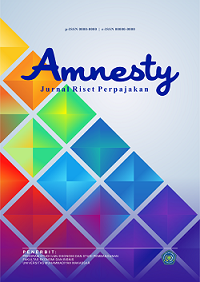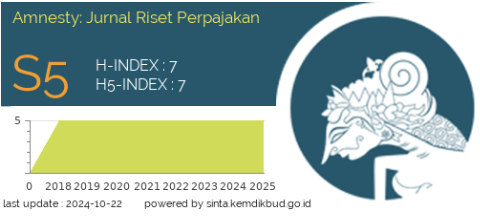Obligation of Ownership of Taxpayer Identification Number (NPWP) and Taxable Entrepreneur Identification Number (NPPKP) for Taxpayers
DOI: https://doi.org/10.26618/jrp.v6i1.10809
NPWP, NPPKP.
Abstract
In the Indonesian government, there is development that covers various aspects with the aim of realizing development, so the state requires self-assessment to register with the KPP to get NPWP and NPPKP. This research is formulated as follows: understanding of NPWP and NPPKP, sanctions for not registering NPWP, and NPWP as a means of tax administration. Sanctions for not registering NPWP and NPPKP, will result in administrative sanctions of 2% to 48%, in confinement for 6 months to 6 years, including a fine of twice the tax payable and the maximum amount of tax to be paid. As a result, sanctions can increase taxpayers' awareness of the importance of fulfilling their tax obligations. According to Law Number 28 of 2007 Article 1 No. 6 Taxpayer Identification Number is a number given to taxpayers as a means in tax administration which is used as a personal identification or identity of taxpayers in carrying out their tax rights and obligations. Meanwhile, according to Resmi (2019) the Taxpayer Identification Number (NPWP) is a tool in tax administration that is used as a personal identification or identity of taxpayers.References
Adil, M. (2022). Accountability and Transparency in the Public and Private Sector. International Journal Of Humanities Education and Social Sciences (IJHESS), 1(6).
Adiningrat, A. A., Ruhayu, Y., Rustan, R., Wahyuni, S., & Fitrianti, A. N. (2022). The Effect of Financial Literature and Islamic Work Motivation on the Performance of Food Micro, Small and Business Enterprises (MSMEs) in Makassar City. Budapest International Research and Critics Institute-Journal (BIRCI-Journal), 5(4), 30836-30845.
Adiningrat, A. A., & Warda, W. (2023). The Development of Intensity Model on Technopreneurship to Improve Turnover in Micro, Small and Medium Enterprises (MSMEs) Culinary in Makassar, Indonesia. International Journal of Economics Development Research (IJEDR), 4(2), 218-228.
Abdi, M. N., Suarni, A., & Arham, A. (2022). Analisis Kepailitan Perusahaan Yang Tercatat di BEI Sub Sektor Telekomunikasi. Jurnal Multidisiplin Madani, 2(6), 2705-2716.
Arman, A. (2021). Analysis of Motor Vehicle Tax Revenues before and after the Tax Kring. Point of View Research Accounting and Auditing, 2(2), 144-149.
Arman, A., & Mira, M. (2021). Does Tax Avoidance Make Do Earning Opacity?. Atestasi: Jurnal Ilmiah Akuntansi, 4(1), 88-95.
Arman, A., Mira, M., Masrullah, M., Agustan, A., Firmansyah, F., & Aditya, R. (2023). Financial Literacy and Assistance in Compiling Independent Financial Reports Using Expense IQ Money Manager. Technium Sustainability, 4, 7-12.
Arsal, M. (2021). Impact of earnings per share and dividend per share on firm value. ATESTASI: Jurnal Ilmiah Akuntansi, 4(1), 11-18.
Arsal, M., & Arsal, D. (2019, August). Urban forest and financial resources perspective in Indonesia. In IOP Conference Series: Materials Science and Engineering (Vol. 593, No. 1, p. 012006). IOP Publishing.
Arsal, M., HAMID, N. I. N. B. A., Arsal, R., & Basri, M. (2014). Consumer Behavior of the Islamic banking. International Journal of Science Commerce and Humanities, 59-64.
Arniati, A., Arsal, M., Akhmad, A., Asdar, A., & Adiningrat, A. A. (2020). Impression of Student Knowledge on Decisions Become a Customer of Islamic Banks. International Journal of Business Economics (IJBE), 1(2), 145-152.
Hutagaluh, O., Rustam, A., Sangadji, S. S., Baharuddin, I., & Kurniullah, A. Z. (2020). Responsive Leadership in Preventing Transmission of Covid-19 in the Indonesia-Malaysia Border Area.
RUM, M., ARSAL, M., KHALID, A., & AWALUDDIN, M. (2023). The Distribution of Tax Collectability, Quality of Tax Services Efforts to Tax Coverage Ratio. 유통과학연구 (JDS), 21(6), 107-117.
Rustan, R., Adiningrat, A. A., & Aisyah, S. (2023). Optimizing of Resources Utilization Through Islamic Spiritual Entrepreneurship to Improve The Welfare of Coastal Communities. International Journal of Economics Development Research (IJEDR), 4(2), 170-180.
Rustan, S. A., Aisyah, S., Adiningrat, A. A., Rustam, A., & Anggoro, M. Y. A. R. (2022). Strengthening Of Marketing Information Systems and Accounting Information Systems for Micro Small and Medium Enterprises (UMKM) Food Culinary Makassar. Budapest International Research and Critics Institute-Journal (BIRCI-Journal), 5(4), 30580-30585.
Suarni, A., & Amelia, R. (2023). Analysis of Mosque Financial Management in Ujung Bulu District, Bulukumba Regency, South Sulawesi, Indonesia. Public Sector Management and Accounting Research, 2(2), 10-22.
(NPWP) dan pengusaha kena pajak (PKP). Jurnal Wawasan Yuridika, 22(1), 110-123.
Hadi, H. P. (2008). Tata Cara Pendaftaran Nomor Pokok Wajib Pajak (NPWP) dan Nomor Pengukuhan Pengusaha Pengusaha Kena Pajak (NPPKP) di Kantor Pelayanan Pajak Semarang Barat (Doctoral dissertation, Fakultas Ekonomi Dan Bisnis Universitas Katolik Soegijapranata Semarang).
Etty Muyassaroh, S. E. (2013). Perpajakan brevet A dan B. MediaPressindo. ISO 690.
Indonesia, R. (2008). Perubahan Keempat Atas Undang-Undang Nomor 7 1983 Tentang Pajak Penghasilan. Undang-undang Nomor, 36.
Mardiasmo (pengarang); Maya (editor). (2018). Perpajakan / Prof. Dr.Mardiasmo, MBA., Ak. ; editor, Maya. Yogyakarta :: Andi,.
Sutedi, A. (2022). Hukum pajak. Sinar Grafika.
Nurmantu, S. (2005). Pengantar perpajakan. Yayasan Obor Indonesia.
Inkiriwang, K. G. (2017). Perspektif hukum terhadap upaya penghindaran pajak oleh suatu badan usaha. Lex Et Societatis, 5(4).
Manuputty, I. G., & Sirait, S. (2016). Pengaruh Pengetahuan Perpajakan dan Penerapan Self Assesment System Terhadap Kesadaran Wajib Pajak Serta Dampaknya Terhadap Kepatuhan Wajib Pajak Pada KPP Pratama Jakarta Panjaringan. Media Akuntansi Perpajakan, 1(2), 44-58.
Supramono, S. E., & SE, T. W. D. (2010). Perpajakan Indonesia-mekanisme dan perhitungan. Penerbit Andi.
Budileksmana, A. (2001). Pemeriksaan Pajak Sebagai Upaya Untuk Mendorong Kepatuhan Wajib Pajak. Journal of Accounting and Investment, 2(1), 56-74.
Armanda, D., & Iskandar, H. (2021). Penerapan Sanksi Administrasi Kepada Wajib Pajak Orang Pribadi. Asia-Pacific Journal of Public Policy, 7(1), 37-48.
Halim, A., Bawono, I. R., & Dara, A. (2014). Perpajakan: Konsep, Aplikasi, Contoh, dan Studi Kasus. Jakarta: Salemba Empat.
Empiris pada WP OP di Kabupaten Tegal. Dipenogoro Journal Of Accounting, 435-449.
Indonesia, R. (2007). Ketentuan Umum dan Tata Cara Perpajakan. Undang-undang nomor, 28.
Rustiyaningsih, S. (2011). Faktor-faktor yang mempengaruhi kepatuhan wajib pajak. Widya Warta, 35(2).
Widjaja, H., & Siagian, A. J. (2017). Analisis Penerapan E-System Perpajakan Pada Wajib Pajak Pribadi Terhadap Pelaksanaan Self-Assessment System Dalam Memenuhi Kewajiban Perpajakan. Jurnal Ekonomi, 22(3).




